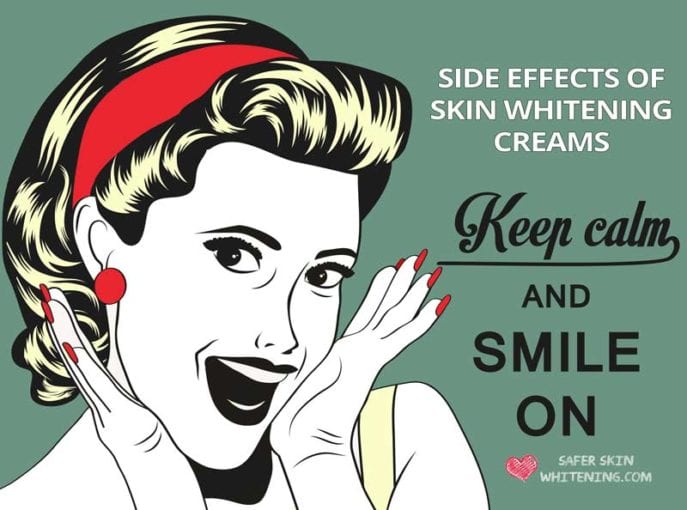Side Effects of Skin Whitening Creams
Using skin lightening products to get fairer skin continues to be a widespread phenomenon. In certain countries like India and Philippines, commercials popularizing creams with skin whitening abilities take a big part of television airtime. Even though our society is learning to appreciate the different forms of beauty across races, fairer skin is still coveted by many.
The need to have fairer skin is quite popular across the Caribbean, African, and Asian countries because of the set beauty standards across the world. These countries have however been fighting against this multi-billion dollar industry. Why would there be such uproar against an industry purely fuelled by “willing buyer, willing seller” kind of relationship?
After looking into the most popular skin whitening products across the world, we were staggered by the number of health risks that some of these creams expose you to. These risks can be attributed to the individual or combination of ingredients contained in the products. To give you an even clearer picture, we took a closer look at some of the most common ingredients in skin lightening creams and their side effects.
Hydroquinone
This is a very common ingredient in skin lightening creams. It has been in use as an effective skin lightening agent for more than 5 decades due to its melanin inhibiting abilities. Hydroquinone is used in the treatment of skin hyperpigmentation conditions such as melasma, chloasma, sunspots, acne scars etc.
Even with such a good profile, let’s make this clear; Hydroquinone [C6H4(OH)2] is made from Benzene, a carcinogen. Do you know what’s common between processing of black and white film, rubber manufacturing, and hair dyes? Well, all of them utilize hydroquinone for their production.
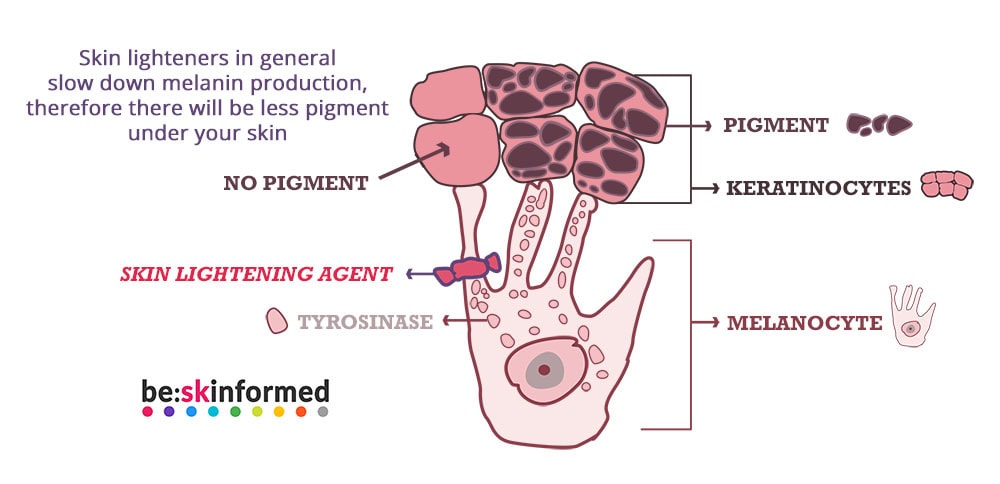
As a result of Hydroquinone being linked to carcinogenicity and exogenous ochronosis among other health risks, many countries and regions have banned its use.
Even though the FDA (Food and Drug Administration) proposed a ban on the use of hydroquinone since 2006, an earlier regulation that allowed skin-lightening creams containing 2% hydroquinone to be obtained over-the-counter and 4 % hydroquinone to require a prescription is still in effect.
RELATED READING:
Side Effects of Hydroquinone
The full list of potential health risks caused by hydroquinone is yet to be discovered since researches done have produced conflicting results. Some cited complications include genetic alterations, carcinogenicity or ability to cause cancer, thyroid disorders and adrenal dysfunctions which were detected in rats/mice orally given hydroquinone.
Mild stinging, redness, irritation, and dryness are common side effects associated with topical use of Hydroquinone. They can escalate to cracking of the skin, blistering, or severe redness, stinging or irritation. While these can be short lived, the same cannot be said of the effects of long-term use of hydroquinone.
With prolonged use, hydroquinone is known to cause bluish-black colouration on the skin especially in dark-skinned people. This condition is referred to as exogenous ochronosis. Contact leucoderma or vitiligo, which is complete depigmentation, can also occur in treated areas.
What happens if you use hydroquinone for longer periods of time?
In case you are using products containing Hydroquinone for longer periods of time, you may develop a condition known as “ochronosis.” This condition leads to a blue-black darkening in certain areas of the skin.

You can also check out this video for more effects of hydroquinone:
Steroid Creams for Skin Lightening
Steroids, also known as corticosteroids are used to treat certain skin conditions. These include psoriasis, dermatitis, eczema, itching and rashes. They are also used in skin lightening. They are not recommended, since using steroids on a long-term basis and in large doses can have adverse effects on your health.
However, research shows that they are misused for the purpose of skin lightening. This leads to thinning of the skin, stretch marks, easy bruising or tearing of the skin, enlarged blood vessels, increased hair growth in treated areas, steroid dependence, and pustular psoriasis among other side effects.
Here’s a small selection of what can happen when you use steroid creams:
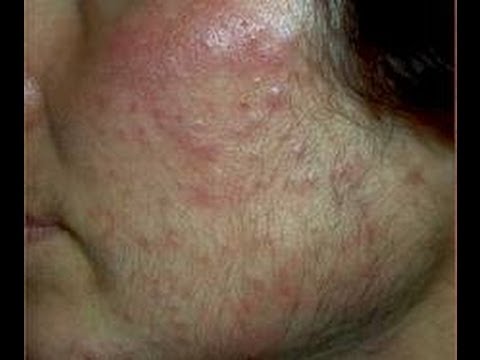
Excess hair growth at the point of application associated with topical steroid use. Source: DrArpitajain.com
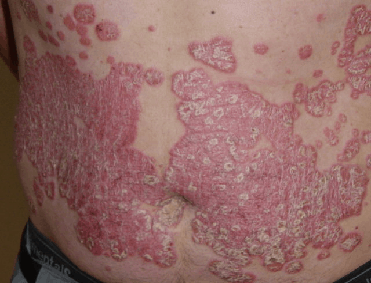
Steroid rosacea, a side effect typical of long-term use of steroids. Source: www.fightvitiligo.com

Thinning of the skin can manifest as exposed blood vessels, bruised skin or stretch marks. Source: YourBusinessHive.com
Talking of Mercury
Mercury is another chemical that is commonly found in numerous skin lightening creams. Back in 2013, the FDA released a notice wherein they requested people to refrain from the use of creams containing mercury.
Mercury leads to mercuric poisoning. The chemical is very easily absorbed into the body. But the problem lies in its removal from the body. If you use creams containing mercury, then you might get skin rashes, discolouration of the skin, and may even lead to scarring.
According to the World Health Organization (WHO), using skin-whitening creams containing mercury can lead to liver and the nervous system damage. Mercury can also lead to depression and even interferes with children’s mental growth.
When you go shopping for skin whitening creams, keep an eye out for words such as “mercury,” “mercurous chloride,” “mercuric,” “Mercurio,” or “calomel.” Unfortunately, not all manufacturers list their ingredients, which is why you should only buy products from reputable manufacturers.
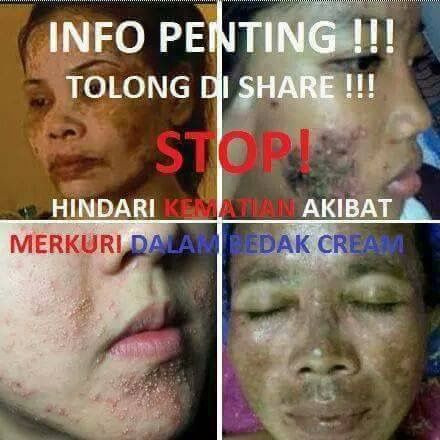
The damage to the skin is as a result of the use of mercury-based products. Source: Steemit.com
As mentioned above, the side effects of skin lightening creams are dependent on the ingredients. Some of these creams come with either one of these or a combination of several. In light of these, here is a summary of what could go wrong with the use of these creams.
- Skin Cancer: Compounds used in skin lightening creams such as Hydroquinone, mercury, and steroids have carcinogenic properties. This means that they have the potential to cause cancer when used for long.
- Liver, kidney or nerve damage: The long-term use of creams containing mercury and its compounds can lead to severe organ damage.
- Thinning of the Skin: Exploitation of skin whitening creams can lead to severe bruising, exposed capillaries, stretch marks, etc.
- Reduction of Skin Healing Properties: Our skin has a regeneration property which means that if you get an injury on your skin, then your skin can heal itself. But long exposure to skin whitening creams can eliminate this property from your skin.
- Scarring: This could result from pustules, cracking of the skin, or other skin conditions that may arise with use of the various creams.
- Skin Irritations: Prolonged use of skin whitening creams can lead to redness, peeling of the skin, rash, dryness, and burning.
- Neurological fetal damage– exposure to mercury when one is expectant can have serious impact on fetal brain.
- Darkening or complete de-pigmentation. This is especially associated with long-term use of creams containing hydroquinone.
- Photosensitivity: Skin lightening creams make your skin susceptible to the harmful UV rays
So, the bottom line is that a lot of the skin whitening creams are harmful. But are there any alternatives? The answer is Yes. Check out the following articles:
The Best Skin Lightening Products for Black Skin without Hydroquinone in 2019Read More Best 6 Skin Whitening/Lightening Creams For Men 2019Read More Best Skin Lightening Creams and Products 2019Read More The Best Skin Lightening Products for Black Skin without Hydroquinone in 2019Read More Best 6 Skin Whitening/Lightening Creams For Men 2019Read More Best Skin Lightening Creams and Products 2019Read More
Article last updated: 29/11/2018
About:
sonia knight
Sonia Knight is the founder of be:skinformed.
Apart from having her own experience with hyperpigmentation, Sonia has gained vast knowledge in the dermatology field. For more info on this, check out our about us page.




